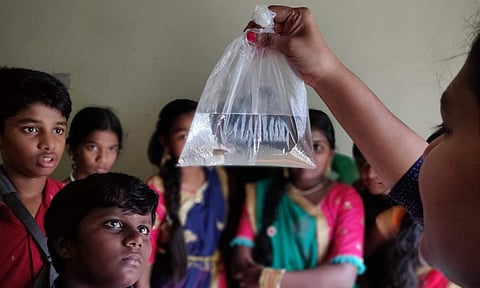

Lab hour has always been the most looked forward to class in school. Looking at specimens and observing slides under the microscope while that creepy skeleton hangs around in the glass case. Such were the scenes when I was in school. But labs remain underutilised resources even today — the practical aspect of Science has take a hit, though the theory is given more than enough attention in class. That's why in June 2019, Srikanth Nanduri started BioMe Life Science in Hyderabad. "BioMe is a platform for young minds to explore Science in a fun way and through research approaches. Our aim is to help students think out of the box and develop their critical thinking and logical reasoning," says the 25-year-old.
And how do they do this? By conducting experiments in schools and colleges that involve the students too. So far, they have conducted over 14 workshops in institutions like Sreenidhi Institute of Science & Technology (SNIST) and schools like Sage School and Delhi School of Excellence. "There was a lack of practical learning, especially in Biology and Chemistry. And when in the lab, students were performing experiments in large groups or only being able to observe them being performed," says the youngster who pursued his BTech in Genetic Engineering from SRMIST, Chennai.
Having worked on the unique compounds in manjadikuru (available in Guruvayur Temple in Kerala) and their effect on cancer cells, he even had enough practical experience of his own. Thus, he and a four-member core team and three-member research team of Science-savvy youngsters started creating modules for these workshops. One of them involved zebrafish, as opposed to mice, and the experiments involved the effect of drugs on the embryos of zebrafish, how to use the gene-editing tool and how it is being used in the treatment of cancer, diabetes and other genetic disorders.
Under Research Connect (RECO), a platform for Science enthusiasts, they organise webinars
This was for colleges. For schools, the experiments are much simpler — understanding why leaves change colour, studying the different stages of embryogenesis and so on. While delivering these workshops with the permission of the institutions, the whole team of BioMe, who's mission it is to introduce research methodologies in schools, is present to guide the students. And the duration? It all depends on the time the institute has allotted.
Carrying equipment to educational institutions and maintaining zebrafish was a challenge, but their passion to bring about a change in the practical aspects of academics drove them ahead. All this was before the pandemic paused all activities. But now, the team is working on affordable Science kits that can ensure that the experimenting doesn't stop at anything.
Some of the sessions they conducted:
- By using the given materials, the students construct a microscope on their own
- Studying distribution of hereditary characters
- Observing the blood flow of the zebrafish with the help of a microscope
For more on them, check out biomelifescience.com
